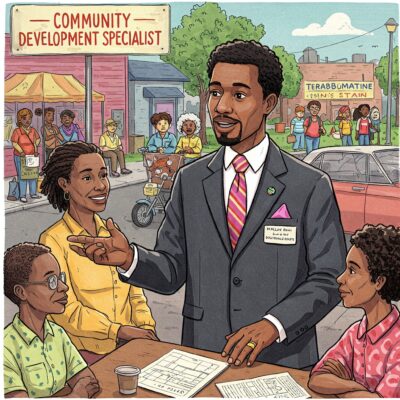Community development specialists work to improve the social, economic, and environmental well-being of communities. They engage with residents, organizations, and governments to develop and implement programs that address local challenges.
What is a typical day as a Community Development Specialist?
– Assessing community needs through surveys, meetings, or focus groups
– Designing and implementing programs to address issues such as housing, education, or health
– Building partnerships with stakeholders, including local organizations and government agencies
– Monitoring and evaluating the impact of programs to ensure effectiveness.
What else might they be expected to do?
– Advocate for community needs at local or national policy levels
– Organize events, workshops, or campaigns to raise awareness about specific issues
– Train community members in skills that promote self-sufficiency and empowerment
What type of training is needed for this career path?
– A Bachelor’s degree in Community Development, Sociology, Social Work, or a related field is typically required.
– A Master’s degree in Development Studies, Public Administration, or Urban Planning can lead to leadership roles.
– Practical experience in community work or program management is crucial.
What kind of personality is needed to excel in this career path?
– Empathetic, resourceful, and organized individuals thrive in this role.
– Big 5 traits: Agreeableness and Conscientiousness.
– Myers-Briggs types: ENFP or ISFJ often align with this career.
What kind of interests do people in this career path have?
– Passion for empowering communities and promoting social equity (Social and Enterprising traits).
– Interest in planning, organizing, and implementing development projects.
– Interests & Aptitude: Social (S), Enterprising (E), and Conventional (C)
Are there any innate skills or aptitudes required?
– Strong interpersonal and communication skills to build trust and partnerships
– Problem-solving skills for developing effective programs and interventions
– Leadership and organizational skills to manage resources and teams
What challenges can I expect to face if I pursue this career path?
– Addressing resource limitations and balancing community expectations
– Navigating cultural sensitivities and conflicts within diverse communities
– Sustaining long-term impact in the face of changing policies or funding
What are the job prospects for this path in Kenya and Africa? What about International prospects for a Kenyan citizen?
– Kenya and Africa: Growing demand for specialists in NGOs, government programs, and international agencies addressing poverty, health, and education.
– International: Community development specialists are sought globally in areas such as urban development, disaster recovery, and refugee resettlement. Kenyan professionals with expertise in grassroots organizing can access these opportunities.
What should I focus on if I choose to pursue this career?
– Gain experience through volunteering or internships in community-based organizations.
– Develop expertise in areas like participatory planning, resource mobilization, or project evaluation.
– Build strong relationships with stakeholders and networks in the development sector.
Which other careers or job roles can I progress to?
– Program Manager for NGOs
– Policy Advisor in Social Development
– Urban or Rural Planner
– Academic Researcher or Lecturer
– Market Researcher

